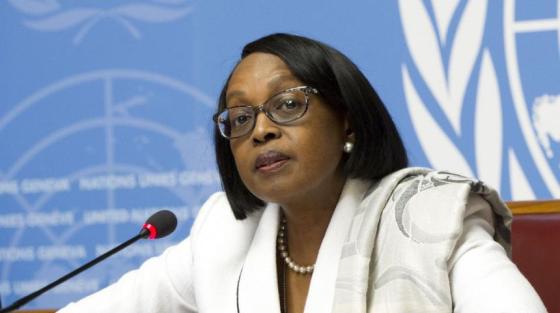International Women’s Day 2023 Message of WHO Regional Director for Africa, Dr Matshidiso Moeti

International Women’s Day 2023
Message of WHO Regional Director for Africa, Dr Matshidiso Moeti
- Dear colleagues and partners,
- I am delighted to celebrate this year’s International Women’s Day with you in recognition of women and girls championing the advancement of transformative digital technology.
- This year’s theme, “DigitALL: Innovation and technology for gender equality,” highlights the role of innovative technology in promoting gender equality and meeting the health and developmental needs of women and girls.
- Globally, the increasing number and use of mobile phones and internet connectivity have facilitated access to health information and services.
- The adoption of digital health and other technological innovations has positively impacted electronic medical records, health data management, security, and effective communication between health workers, patients, and community stakeholders.
- Innovations have equally enhanced capacity building and knowledge translation through online training, webinars, and innovative tools for patient care—such as telemedicine, robotics, and artificial intelligence.
- Efforts at innovation have facilitated improved access to quality health care services and encouraged the participation of individuals, families, and community stakeholders in health care, especially during the COVID-19 lockdowns.
- We have seen that women can be innovators and contribute to transforming the health ofall people on the continent.
- In December 2018, we organized the first WHO Africa Innovation Challenge. It was a deliberate effort to find solutions to Africa’s unmet health needs and recognize home-grown innovations that could solve Africa’s health challenges.
- More than a third of the over 2 400 submissions from 77 countries came from women-led enterprises, and one of them emerged among the top three awardees. We need to encourage and support such dedication.
- I’m glad to see the enthusiastic scale-up of ICT-based innovation deployed to fight COVID-19 and other diseases in the region.
- These include using drones in Ghana, Rwanda, Sierra Leone, South Africa and Malawi; robots for clinical assistance in Rwanda; satellite imagery-driven vulnerability mapping dashboards in Ghana, Nigeria and Sierra Leone; and WhatsApp Chatbots in South Africa.
- Similarly, Angola, Nigeria, Ethiopia and Uganda are using self-diagnostic tools, contact tracing apps, solar-powered automatic handwashing tools—to mention but a few.
- In the area of reproductive health, innovative technologies such as YeneHealth, a digital innovation supporting women to gain self-agency; NoviGuide 2.4, a neonatal application helping to recognize and act when danger signs are noticed; and Safe Delivery smartphone applications being tested in eight countries have shown added value to reproductive, maternal, newborn, child and adolescents services when deployed widely.
- Nevertheless, we must do more to remove the digital gender divide, mainly impacting vulnerable women and girls, especially those in rural and remote areas with low education and socioeconomic status.
- According to a 2021 report by the Association of Mobile Operators, inadequate infrastructure, lack of digital skills for the internet and ICTs, and gender-related barriers around access to and control over resources are the main obstacles to “meaningful connectivity” for women and girls.
- We can address this challenge by:
1. Creating awareness about the digital gender divide.
2. Advocating for policies and legal frameworks to keep women and girls safe.
3. Promoting women’s participation in science, technology, and ICTs.
- By doing these, we will ensure that disadvantaged and vulnerable women and girls also benefit equitably from digital and technological innovations for their improved health and well-being.
- Let us also work to ensure that women and girls are safe online. This will free them from online gender-based violence, including cyberstalking, sexual harassment, trafficking, and gross breaches of privacy.
- As we celebrate International Women’s Day, I urge all stakeholders—from governments and partners to civil society and citizens—to support country-driven and gender-sensitive approaches to close the existing digital gender divide.
- Happy International Women’s Day.
-Ends-
